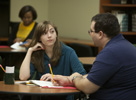Southeastern offers students strategies to succeed
Tuesday, October 29, 2013 
by: Rene Abadie
PROVIDING HELP – In Southeastern Louisiana University's Writing Center Thomas Moore, right, gets some assistance on a writing project from English graduate assistant Rob Carper. The Writing Center is one of a number of resources at the university that students can turn to for assistance in their academics.
HAMMOND – Based on an evaluation of data, Southeastern Louisiana University's Student Retention and Progression Task Force is examining some very specific strategies designed to identify and help students early on who may be experiencing problems academically. Faculty, staff and administrators are working with students using a variety of options and best practices that enhance the freshman experience, with a special focus on helping students succeed in the classroom and progress in their selected fields of study.
While Southeastern has resources for such students readily available, the task force is working on determining additional data-based strategies that can be implemented to further help students perform and succeed academically.
At nearly every university, many freshmen face difficulties associated with the transition from high school. Retaining those students while maintaining academic rigor has become an increasingly important concern. A large part of the evaluation of the success of an institution has been placed on its freshmen retention and overall graduation rates.
"Over recent years, our retention and graduation rates have trended upwards, so we were a little concerned when the fall semester showed a downward tick in our freshmen to sophomore retention numbers," said President John L. Crain. "We're looking at expanding what has worked for us in the past, as well as implementing new short-term and long-term strategies that positively impact student retention."
Certain "barrier" courses seem to present problems for freshmen students. For several years, Southeastern's English and math faculty have provided mid-term grades to students with a grade lower than C. "Our faculty reach out to students who are at risk of earning an unsatisfactory grade, via email or person-to-person, to ensure the students are aware of their situation," said Tim Hudson, head of the Department of Mathematics. "They can work together to determine strategies or find the resources that can help them improve the grade."
"Some incoming freshmen have trouble adjusting to college-level expectations in their first course, so they may experience something of a shock when they take their first test," added Hudson. "We want to reach these students and encourage them to make significant changes in how they study and prepare for assignments and tests before it is too late. We hope this shows that we value them as students and want them to succeed."
"For years now, the English Department has been reporting midterm grades for students earning grades below a C in our writing courses," said Freshman English Coordinator Natasha Whitton. "We send these students a letter encouraging them to use the many resources that we make available within the department for students to improve their writing. All of our writing faculty use their office hours for one-on-one sessions with students to go over their work. If those hours are not convenient, we have a fully-staffed Writing Center open Monday through Friday. The Writing Center tutors have access to all faculty assignments so that they can gear their sessions to the needs of the individual student."
Data show that "barrier" courses are not limited to English and math, so the university is now notifying students in all freshman-level courses of mid-term grades lower than C. Faculty are contacting those students to discuss possible reasons for their unsatisfactory performance and means for improving their performance. Associate Professor of Communication Claire Procopio said faculty in the Department of Languages and Communication are making a special effort to let students know what is available to help them, whether it be tutoring services through the Center for Student Excellence, Counseling Center services, or financial aid assistance, to name a few. "Our faculty members are letting these students know when we see they are in trouble," she said. "We're asking them, 'What can we do to help you?' It's also very motivational. We are reminding them that we value them and want them to do well."
Natasha Whitton in the Department of English added, "Our mid-term grades give us the opportunity to remind our students of the help that is available for them. I am very pleased this year to be able to join this work with the full campus in retention efforts."
In addition to providing mid-term grades and faculty outreach to at-risk students, Southeastern offers a variety of other resources. Among these are intensive labs for math assistance, learning communities in residence halls, departmental student lounges where students can address academic and other problems, and the Center for Student Excellence, which provides advisers, tutors, and supplemental instruction for students in a wide range of disciplines.
The College of Business instituted two programs to assist students experiencing academic difficulties: the Academic Success Plan for students readmitted on academic appeal, and a specially-designed program that targets business majors who have been placed on academic probation. The programs – which address issues such as time management, strategic selection of course combinations, and achieving balance in school, work and life – have proven to be successful. Students completing the Academic Success Plan program show a 70 percent rate of success in remaining in school compared to only 28 percent who don't participate.
"We're now getting requests from students who are not at academic risk to be a part of these programs as well," said Lynn Stirling of the College of Business. "They have heard about the successes of students in the programs and even though they are not at-risk students themselves, they see an opportunity to improve their performance through these programs."
Senior finance major Mia Broussard says the program turned her academic career around.
"When my grades were low and I almost quit school, I took part in this amazing program, and that has helped me turn my grades around," Broussard said. "I'm actually excited about school now."
"Southeastern faculty, administrators, and staff recognize the importance of reaching out to students and providing academic support to help us perform well," said SGA President Greg Crovetto. "Students today face many challenges. Time for study has to be squeezed into a full schedule of courses often accompanied by a full-time or part-time job and perhaps family responsibilities."
"Southeastern cannot do our work for us," he added. "We appreciate the university provides resources to facilitate student success and is going the extra mile to make sure students are aware of those resources."






